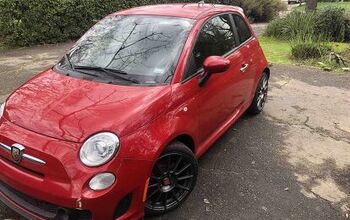How Will the UAW's War With Nissan End?

The South has been a longstanding hurdle for the United Auto Workers. Having been unsuccessful in its efforts to organize foreign-owned automakers outside its Midwestern stronghold for years, the UAW is running out of options. Mercedes-Benz, Volkswagen, and Tesla have all managed to stave off unionization and many wondered what the UAW would do after its most recent loss at a Nissan plant in Canton, Mississippi.
It decided to double down.
Despite losing the vote by a fairly crushing margin, the UAW has sought intervention through the National Labor Relations Board by formally accusing Nissan of playing dirty. But how the legal proceedings will play out is a matter of some controversy, and the group’s strategy is somewhat muddled.
The union has provided the NLRB with evidence of what it calls a ratings system Nissan used to track its employees’ willingness to organize. The UAW had been making public claims that the automaker waged an ugly campaign against it prior to August’s vote, and the Labor Relations Board has pursued some of those charges. Among them are allegations that Nissan threatened to fire employees for union activity and corporate rumors that the plant would be abandoned if its workforce elected to organize under the UAW.
Nissan has publicly stated that all the claims against it are categorically false. But Bloomberg cited two sources as validating the automaker’s surveillance measures.
Eric Hearn, who’s been with Nissan since 2012, said he confronted his supervisor before the vote, asking whether the company was rating employees based on their union stance. The supervisor said he was “quite sure” that was the case. Hearn later returned to the plant with a shirt reading “I am not a -2,” a reference to the rating he heard Nissan gave to the most pro-union employees.
Hearn also stated he believed workers in favor of unionizing were being surveilled by management and security. He made mention of an instance when he and other pro-union employees attempted to sign up their peers at the factory entrance as high-ranking staffers stood by. In addition to the proposed monitoring, Hearn noted it also worked as an intimidation tactic against prospective converts. “They wouldn’t even look at you,” he said.
One former supervisor, Calvin Ealy, backed up some of those claims. Fired in 2013, Ealy said company officials requested he provide information about how employees were likely to vote. “I knew at the time it was wrong — I considered it to be spying – but hey,” he said. “I needed a job, to take care of my family.”
However, the UAW’s goals are a little perplexing on the subject of surveillance. While the allegations point to some shady behavior, monitoring employee sentiments isn’t illegal. “The employer doesn’t have to blind his eyes, cover his ears and pretend that he doesn’t know,” said former NLRB member Marshall Babson.
It won’t be a legal issue until the Labor Relations Board decrypts how Nissan obtained the information and what it did with it afterward. For example, asking managers what their employees are up to isn’t against the law, but convincing them to check up on union activities might be. Likewise, any threats or rewards promised as a result of supporting or opposing unionization is extremely illegal. Both of those matters are incredibly difficult to prove, however.
The list itself could be damning enough. Wilma Liebman, who chaired the NLRB through the Obama administration, said if employees were informed of the ratings system’s existence, that alone could be illegally coercive. “There’s this implied message that the company people will be rewarded and the union adherents will suffer,” she explained.
Even some management-backing firms agree that the list was a bad idea. “It’s going to be very hard to explain what legitimate purpose you’re using that list for,” said Brian Paul, who trains companies on how to effectively oppose unionization.
However, the NLRB might not be as willing to listen to union concerns under the current administration. While President Donald Trump has urged automakers to stay within the countries, he’s also acknowledged that heading south would be a wise tactic — suggesting those companies would possess a stronger bargaining position with employees not operating under the UAW.
Current NLRB chairman Philip Miscimarra also has an extensive history representing companies against workers. In fact, we couldn’t find a single instance where the inverse was true while he was a practicing lawyer. It was also assumed he was tapped by Trump specifically to roll back the NLRB’s pro-union policies (implemented during the Obama administration). At the very least, he has been accused of holding a rampant pro-business stance by labor groups.
However, Miscimarra has said he will be leaving his post in December due to “personal reasons.” That means the UAW might find itself dealing with someone more sympathetic to their position before the year is out.
[Image: Nissan]

A staunch consumer advocate tracking industry trends and regulation. Before joining TTAC, Matt spent a decade working for marketing and research firms based in NYC. Clients included several of the world’s largest automakers, global tire brands, and aftermarket part suppliers. Dissatisfied with the corporate world and resentful of having to wear suits everyday, he pivoted to writing about cars. Since then, that man has become an ardent supporter of the right-to-repair movement, been interviewed on the auto industry by national radio broadcasts, driven more rental cars than anyone ever should, participated in amateur rallying events, and received the requisite minimum training as sanctioned by the SCCA. Handy with a wrench, Matt grew up surrounded by Detroit auto workers and managed to get a pizza delivery job before he was legally eligible. He later found himself driving box trucks through Manhattan, guaranteeing future sympathy for actual truckers. He continues to conduct research pertaining to the automotive sector as an independent contractor and has since moved back to his native Michigan, closer to where the cars are born. A contrarian, Matt claims to prefer understeer — stating that front and all-wheel drive vehicles cater best to his driving style.
More by Matt Posky
Latest Car Reviews
Read moreLatest Product Reviews
Read moreRecent Comments
- Dartman https://apnews.com/article/artificial-intelligence-fighter-jets-air-force-6a1100c96a73ca9b7f41cbd6a2753fdaAutonomous/Ai is here now. The question is implementation and acceptance.
- FreedMike If Dodge were smart - and I don't think they are - they'd spend their money refreshing and reworking the Durango (which I think is entering model year 3,221), versus going down the same "stuff 'em full of motor and give 'em cool new paint options" path. That's the approach they used with the Charger and Challenger, and both those models are dead. The Durango is still a strong product in a strong market; why not keep it fresher?
- Bill Wade I was driving a new Subaru a few weeks ago on I-10 near Tucson and it suddenly decided to slam on the brakes from a tumbleweed blowing across the highway. I just about had a heart attack while it nearly threw my mom through the windshield and dumped our grocery bags all over the place. It seems like a bad idea to me, the tech isn't ready.
- FreedMike I don't get the business case for these plug-in hybrid Jeep off roaders. They're a LOT more expensive (almost fourteen grand for the four-door Wrangler) and still get lousy MPG. They're certainly quick, but the last thing the Wrangler - one of the most obtuse-handling vehicles you can buy - needs is MOOOAAAARRRR POWER. In my neck of the woods, where off-road vehicles are big, the only 4Xe models I see of the wrangler wear fleet (rental) plates. What's the point? Wrangler sales have taken a massive plunge the last few years - why doesn't Jeep focus on affordability and value versus tech that only a very small part of its' buyer base would appreciate?
- Bill Wade I think about my dealer who was clueless about uConnect updates and still can't fix station presets disappearing and the manufacturers want me to trust them and their dealers to address any self driving concerns when they can't fix a simple radio?Right.


































Comments
Join the conversation
Typical leftist behavior - when they can't win in the marketplace of ideas to shift public opinion and win elections, they take their policies and positions to what they hope will be leftist leaning judges or government bureaus to thwart the will of the people, because obviously the "people" don't know what is good for them.
It's strange that Volkswagen isn't unionized. Company management indicated that they were open to unionization (and even welcomed it) before construction of the plant started. What caused them to change their minds? Was it because they didn't see the UAW as being a partner like IG Metall?